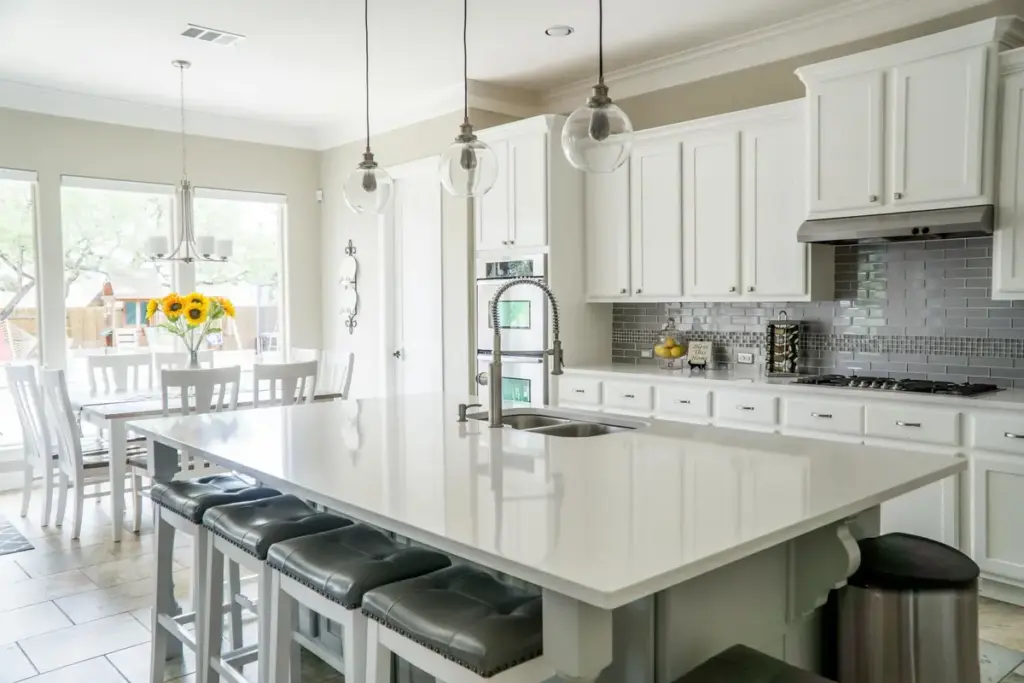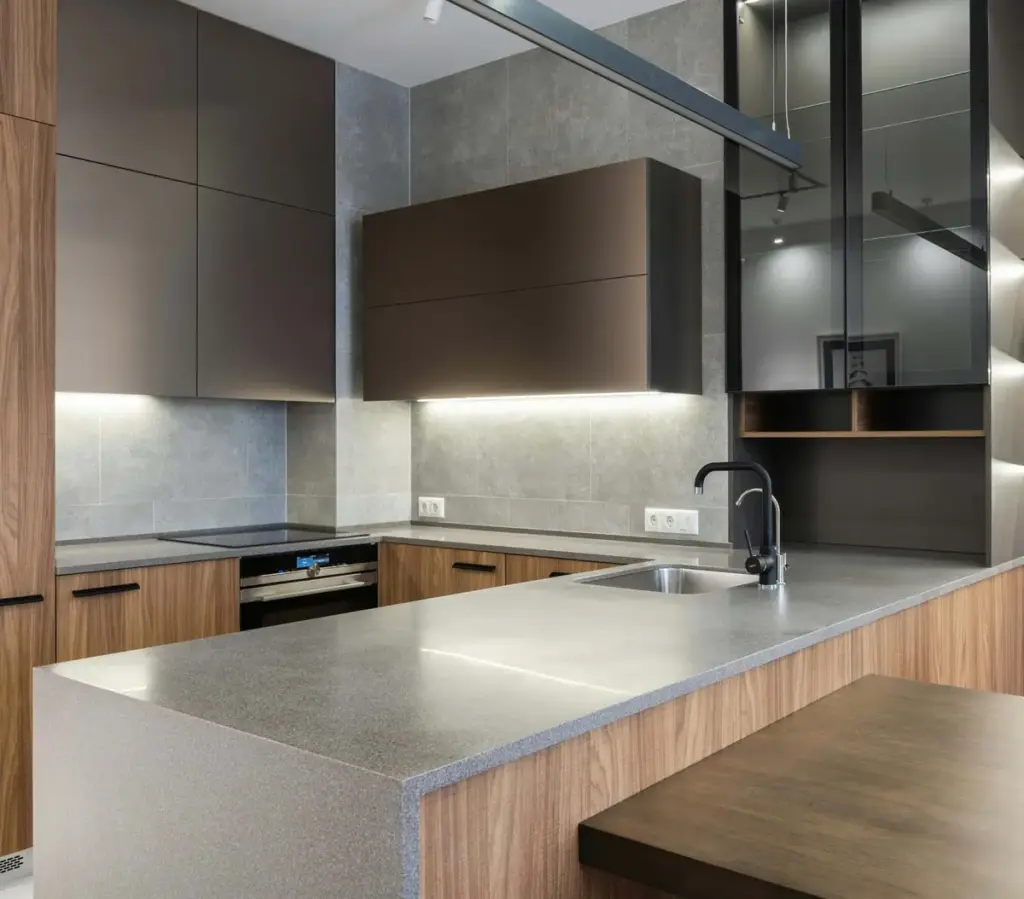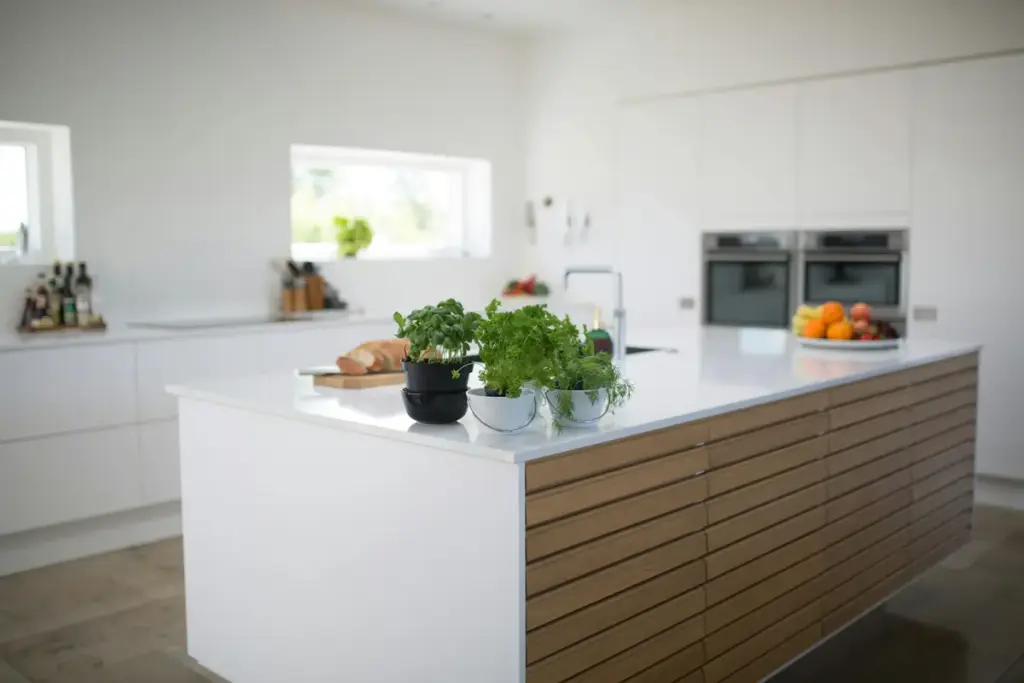Stone Countertops make your Kitchen so beautiful and modern. If the kitchen is the most important room in the home, according to 9 out of 10 real estate agents (the master bedroom being the other), it makes sense that kitchen features and renovations offer the best ROI to homeowners. What are the three things you look for in a kitchen renovation? 1) durability, 2) style and 3) long-term resale value are hard to argue against.
Table of Contents
In those regards, homeowners will learn that their biggest three kitchen renovations will be the floor, the cabinets, and the countertops. It’s been said that an immaculate presentation in one of these three areas can be enough to sell a home alone. The best thing about these renovations, however, is that you get to enjoy them now – but still maintain (usually 100% or more) resale value in the future.

For the sake of this article, we’re going to break down the importance of your stone countertops – specifically if you opt to go the stone route. Everybody knows that granite is the All-American Quarterback when it comes to countertops, but that’s hardly your only option in terms of both immediate enjoyment and long-term value. To find the perfect stone countertop, you need to mesh your budget, your tastes, and the appeal to future buyers – luckily, there are options aplenty.
Benefits of Stone Countertops
First and foremost, the most noticeable benefit of stone countertops is their look. There’s a reason that modern wall panelling and floor tiling are gearing towards emulating the natural stone look and texture – because it’s awesome. While the beauty of stone countertops goes well beyond skin deep, there are some legitimate benefits of having it as your preferred countertop material aside from style.
First off, the wear factor on any stone feature is amazing. It’s one of the few building materials that improves in value as it gets older, aged, and weathered. Stone is like a comfortable pair of jeans in that it’s almost its least desirable when installed new – but wears on you over time.
Not to knock them – but there are downfalls to almost any type of countertop material besides stone. For example, take a look at these negative aspects of some tried and true favourites:
Butcher’s Block
It’s a good premise, but the dependability all depends on how well the surface is sealed. Even a minor imperfection in the laminate coating can lead to stains, rot, bacteria growth, and more.
Concrete
Seemingly your best choice for durability outside of stone. The truth is concrete chips very easily and is prone to develop cracks. If you apply a topical sealer, you’re protecting against stains but not heat. If you opt for a penetrating sealer, you’re resisting heat but not stains – it’s not a win-all solution.
Stainless Steel
They are very easy to clean, but at the same time, you’re always cleaning them because of smudge marks. It can also be noisy and scratch easily and is generally not recommended if you don’t like the ‘nails on a chalkboard’ of a knife against a smooth surface.
Laminate
It’s not much of a stone countertop, and if you are on a budget, this is a good option to choose without breaking the bank. However, it’s very susceptible to deep cuts and damage.
Based on these downfalls of all other types of countertop materials, stone is your best investment both for now as well as in the long run. Granite, marble, limestone, quartz, soapstone, and more each offer their benefits to your home based on how you use your kitchen.
Types of Stone Countertops
Once you’ve confirmed that stone countertops are indeed the route to take for both short-term enjoyment as well as long-term resale, it’s important to know a few of the major properties behind each major type of rock. Although looks will determine a lot of the appeal, it’s important to know what you’re getting as a whole with these stones:
Granite Countertops
This material has been the countertop of choice for homeowners for over two decades and holds the ‘wow’ factor that other stones just can’t match (yet). Granite is more affordable than ever, thanks to the fact that the availability has increased and the market has saturated, making granite stone countertops a ‘given’ and not a ‘luxury.’
The thing that consumers love – and why it’s the most popular stone choice – starts with the veining. Looks aside, granite is also the most durable stone in the world. A granite countertop is technically scratch-resistant, heat-resistant, and even moisture-resistant with a proper sealer. Granite has good looks…and personality.
Marble Countertops
Still an elite countertop material and very lavish, but it might not be the best choice for the wear and tear of a kitchen. A perfect bathroom countertop material, though with incredible resale value. One of the biggest advantages of a marble countertop anywhere in your home is distinction. Marble is one of those materials that needs no introduction – great for guests and future home buyers. The other biggest advantage of installing marble is the heat resistance. The stone doesn’t wear the best for everyday traffic – but it will stand up to the intense heat of, say, a curling iron or hair dryer.
Quartz Countertops
A bright material with prominent veins. Quartz is nonporous, so even though it is traditionally lighter, stains are less distinguishable. Quartz is also actually harder than both granite and concrete.

A lot of homeowners are starting to prefer quartz countertops over granite. For one, granite has gotten too ‘normal’ – not necessarily a bad thing, but not good for those looking for a unique look in their home. Quartz is scratch, water, and chip resistant, which contradicts its light and vulnerable demeanour. As stated, the non-porous properties of quartz make it a game changer in the stone countertop world. This also means that quartz countertops need no maintenance besides cleaning – no sealing, no waxing, no polishing, etc.
Slate Countertops
A common household material that is also used in roofing tiles, among other areas. Slate countertop colours are usually restricted to blacks, grays, and some browns, but many consumers like that subtle yet smooth aspect of the stone. Slate roofs are the costliest in the industry, but slate countertops are some of the most affordable among any stone products.
Slate is also non-porous, which means it has incredible stain-resistant qualities – both for water, wine, oils, and other liquids. Non-porous stones are healthier as they don’t harbour bacteria, plus they are easier to clean. Slate in-home use is often split into very thin pieces – which explains the affordability – it just means consumers have to pay attention to the quality of the rock.
Soapstone Countertops
An incredibly durable stone that is non-porous and does not require any sealant. Colours are limited to blue and green hues, and although the material is soft, imperfections can be glossed over with mineral oil application. You’ll see soapstone in a lot of commercial bathrooms as well as school science laboratories. The reason why is that it’s arguably the ‘healthiest’ stone countertop out there. While other materials are resistant to germs and absorption, the natural properties of soapstone almost propel irritants like a bug zapper. Soapstone is 100% non-porous meaning it never has to be sealed or laminated. Soapstone is a flat, impenetrable surface that truly is impenetrable.
Limestone Countertops
Sounds like something you’d find out in your driveway, and the light cream colours are often indicative of gravel. That distinguished appearance, however, made limestone a necessity in countertop uses – especially when matched with a stone floor. One of the first advantages of having a limestone countertop integrated into your home is the availability.

If you grew up in the Midwest, limestone doesn’t sound like an asset – it sounds like gravel. Still, limestone is both light – and bright – which makes it an ideal kitchen countertop building material. Limestone is less dense than granite – and doesn’t have the pretty colours and grains associated – but it’s usually just as hard. Limestone is a worker rock that is an affordable and durable blue-collar choice for your countertop.
Engineered Stone Countertops
Take the look of your favourite stone and then apply superior heat and stain resistance, and you’ve got the epitome of engineered stone countertops. The only downfall of engineered stone is that it supposedly lacks ‘natural’ grains and colours, but most consumers will gladly trade that for a longer life span and an increased overall ROI. The reason that engineered stone countertops (or floors, etc.) were developed was to counter the natural pitfalls of organic materials.
There are very few perfect stones, whether they’re more apt to heat damage, liquid stains, etc. Engineered stone uses the natural grains of the rock that make it so attractive but combined with an adhesive that makes it dimensionally stable. This compound is chemically altered to stand up to heat, moisture, and acidic environments while still maintaining the elegant looks of stone. The two most common versions are marble and quartz, but modern manufacturing methods have granted homeowners the best of both worlds in terms of style and stability.
Although they say that the kitchen is the most valuable room in the home, it doesn’t mean that stone countertops don’t add value in rooms such as bathrooms or on, tables or outdoor living areas. The value of a stone countertop comes in the form of personal enjoyment, practical appraisal, and resale estimates. In those regards, there’s not a countertop material in the industry that can supply what stone countertops do – regardless of what type of rock you choose. You can expect to recoup upwards of 90% of your investment or more while also maintaining a quality countertop over the years – that’s something wood, laminate, stainless steel, or even concrete can’t claim.




